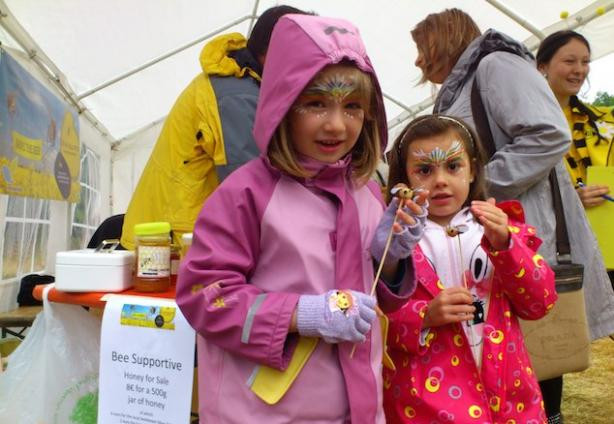Besides giving us honey, which tastes great and is a natural sweetener, bees are also important as pollinators. It is not only “no honey bees, no honey”, but also “no bees, no pollination, no vegetables and fruit”. Without bees, life as we know it would disappear. That’s why there has been a lot of civic movement all over the world, and Luxembourg is no exception.
In Luxembourg there is an English-speaking group of beekeeping enthusiasts. “Bee Together” organises visits to hives for people to learn about the importance of bees and beekeeping, mentors people who consider becoming beekeepers, organises beekeeping courses, provides land where people can keep bees, and encourages people to join the beekeeping federation so they can enjoy the benefits of membership and be part of the larger community.
On Sunday June 29, Bee Together participated in the Nature Festival at the House of Nature in Kockelscheuer. Sharing a stand with the “Save the Bees” campaign, the public had the chance to sign up for a visit to the hives, taste honey and learn about bees. For those interested in taking up beekeeping in English, Bee Together is the place to go.
One of the most common misconceptions regarding beekeeping in Luxembourg is that you need to have your own garden or land to be a beekeeper. As many of us live in apartment buildings, beekeeping seems like a distant dream. However, you can live in an apartment and still have hives; not in your apartment, don't worry!
Bee Together can help you find a suitable place for your hive, either on public or private land. If you have a meadow where you would like to have someone else's hives, get in touch and we can make it happen!
The last visits of the hives for 2014 are taking place on July 5 and July 6.
Did you know that:
The queen bee has no privileges; she is more of a slave to the needs of the colony. The queen bee can live up to 5 years and is the only bee that lays eggs. She is busiest in the summer months, when the hive needs to be at its maximum strength, and lays up to 2,500 eggs per day.
There is the honeybee… and 22,000 species of bees out there.
Worker honeybees are female, live for about six weeks and do all the work!
Honeybees can’t see red… despite the fact that they have five eyes and can see ultraviolet light.
For ideas on how you can bee part of the solution, please consult page 4 of the natur&ëmwelt English-speaking section’s April newsletter. If you would like advice on honeybees, wasps or bumblebees, please contact us or the natur&ëmwelt nature consultancy.
Crista Filip is a volunteer with the Bee Together group. If you would like to hear about our plans for the autumn 2014 and 2015, please register to come to our meeting in October (the date, time and venue are still to be announced). If beekeeping is in your future, you can start preparing now.
